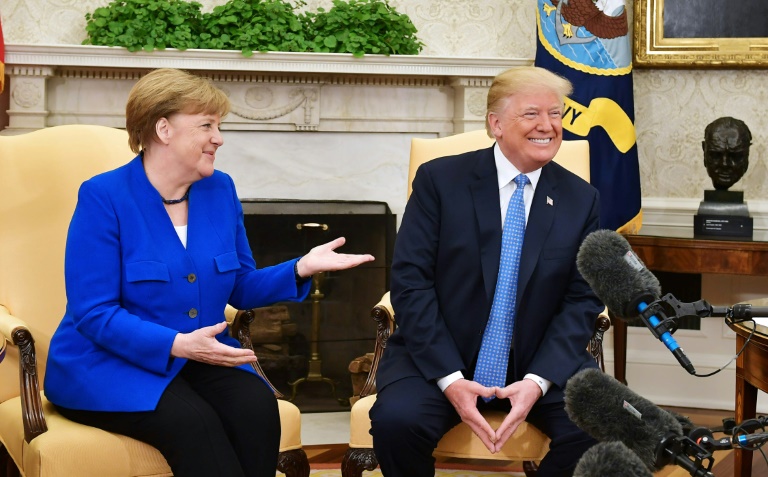Trade tensions between the European Union and the United States ran high Thursday as the clock was ticking for US steel and aluminum tariffs against European producers to kick in.
President Donald Trump’s administration is planning to impose tariffs on European steel and aluminum imports after failing to win concessions from the European Union, a move that could provoke retaliatory tariffs and inflame trans-Atlantic trade tensions.
The tariffs are likely to go into effect on the EU with an announcement by Friday’s deadline, according to people familiar with the discussions. The administration’s plans could change if the two sides are able to reach a last-minute agreement, said the people, who spoke on condition of anonymity to discuss internal deliberations.
Trump announced in March the United States would slap a 25 percent tariff on imported steel, and a 10 percent tariff on imported aluminum, citing national security interests. But he granted an exemption to the EU and other U.S. allies; that reprieve expires Friday.
US Commerce Secretary Wilbur Ross on Wednesday rejected calls to extend exemptions on the punishing import tariffs and warned that duties for massive US imports of automobiles were on the horizon.
The prospect of the metals tariffs taking effect on Friday caused mounting frustration in Europe, the single-largest source of US steel imports.
“World trade is not a gunfight at the O.K. Corral,” French Economy Minister Bruno Le Maire quipped Thursday, in reference to a 1957 western movie.
Le Maire warned that the EU would take “all necessary measures” if the US imposed the tariffs.
– Not a western -“It’s not everyone attacking the other and we see who remains standing at the end,” he said, declaring that the stiff taxes would be “unjustified, unjustifiable and dangerous”.

German Chancellor Angela Merkel said the EU would respond in a “firm and united” manner to the tariffs.
“We want to be exempt from these tariffs” which were “not compatible” with World Trade Organization rules, Merkel told a press conference with Portuguese premier Antonio Costa in Lisbon.
German Foreign Minister Heiko Maas meanwhile warned against the threat of protectionism, telling reporters Thursday that international partners could have “no interest in the clock being turned back” on trade policy.
“To put it clearly: protectionism and isolation with regard to free trade must be kept from getting the upper hand again,” he said after talks with his Chinese counterpart Wang Yi.
The Wall Street Journal reported on Wednesday that Washington would allow the EU exemption to expire, after weeks of talks failed to yield a compromise, such as a quota arrangement.
EU-US tensions are casting a shadow over a meeting of finance ministers from the world’s top economies which opens in a Canadian mountain resort on Thursday.
– Trade hijacks G7 -The harsh duties imposed in March to combat global overcapacity of the metals and boost domestic production, were only among a flurry of different developments, coinciding with a political crisis in Italy, which this week has roiled markets.
US Treasury Secretary Steven Mnuchin is due to hold meetings with his European counterparts to discuss President Donald Trump’s confrontational trade agenda, officials said.
But Jacob Kirkegaard, senior fellow at the Peterson Institute for International Economics, told AFP that the agenda Canada, the current G7 chair, set for the meeting — which included uncontroversial themes such as inclusive development and innovation in finance — would be swept aside amid raw relations between America and its traditional allies.
“Hopefully they can agree to keep talking about these issues, although that is unlikely,” he said, adding that Trump’s recent actions proved to US allies that Washington would not de-escalate the dispute.
“I think the only thing you can hope for is no further harm.”
In recent weeks, Trump has repeatedly switched course on key foreign policy and trade issues, first imposing then easing sanctions on Chinese telecoms equipment firm ZTE, and declaring a “hold” on a looming trade war with Beijing, but then announcing he would press ahead with $50 billion in tariffs on China’s tech sector.
Last week, the administration also launched a national security-based investigation that could result in stinging tariffs on the autos the US imports annually, just as it has for the smaller aluminum and steel industries.
And Ross also vetoed a traditional joint statement at an annual economic meeting in Paris this week which denounced protectionism, further angering US allies.
– Chopping and changing -Relations among G7 nations represent particularly high stakes as they account for more than 60 percent of global GDP.
And the sectors where Trump has chosen to wage his battles are key to trade in the economic bloc.
More than 60 percent of US auto imports — an industry that closely binds US and Canadian manufacturing — come from G7 countries, as well as more than 50 percent of aluminum imports and nearly 36 percent of steel.
Stephanie Segal, deputy director of the Simon Chair in political economy at the Center for Strategic and International Studies, said Washington’s many about-faces meant consensus in the near-term was an increasingly dim prospect.
“It doesn’t feel particularly constructive to me and I have to believe that the end game is not to create market instability, which is precisely what something like this does,” she told AFP.










